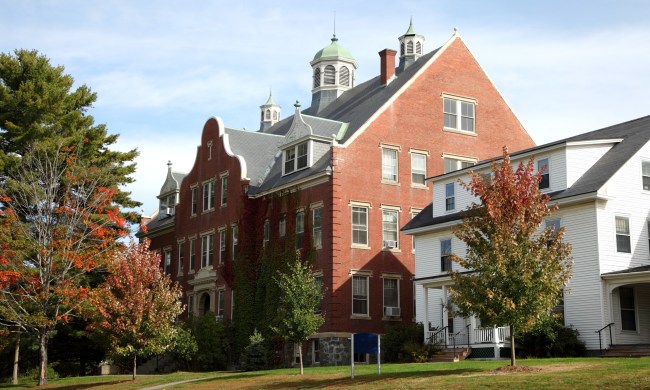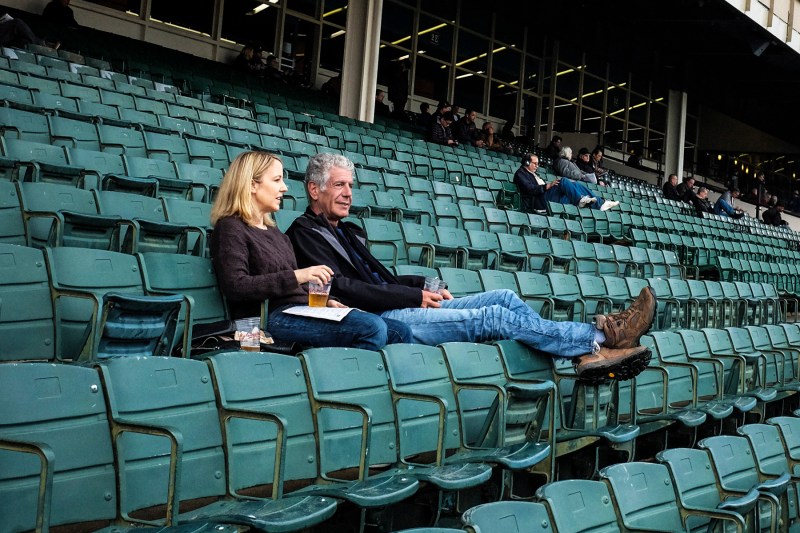
Chef Josh Habiger had just wrapped the second of two shoots at his Nashville establishments when Anthony Bourdain invited him to a jiujitsu class. At least Habiger thought it was an invitation. But he couldn’t be sure.
Bourdain was in town for a week shooting a Nashville episode of his CNN show Parts Unknown, and after first speaking with Habiger in his speakeasy, The Patterson House, and then at his James Beard-nominated restaurant, The Catbird Seat, the two continued off the record — about what was really going on in Nashville, its interloper chefs coming down from New York with big egos and dismissive opinions, and about jiujitsu. “You spend a lot of time talking about jiujitsu,” Habiger remembers, laughing. Bourdain wasn’t just a practitioner; he was a fanatic, and he went on to explain that he and his entire production crew made it a habit to find local gyms in the cities they visited, rolling every morning before the shooting schedule commenced.
Related Guides
Habiger, who at the time was taking cardio kickboxing classes, expressed a longstanding curiosity. Bourdain swiveled. “Why don’t you just do it?” he asked.
Those words have stuck with him, Habiger says. “Any time that thought in your head is, ‘Oh, that’s something I want to try,’ just f—in’ do it.” After confirming it was a genuine invite, Habiger took his first class with Bourdain and a few others, and when he tells the story to The Manual, he’s calling from the car, driving to his first class session after the year-long pandemic lockdown.
The point is that even now, almost three years after his death, Bourdain’s words hold weight.
That’s the subject of World Travel: An Irreverent Guide
In speaking with The Manual, Woolever says unequivocally that the book would have been different had the late chef been alive on its release. “I’m very aware, if Tony were still alive, he would be the one promoting this book,” she says.
“Tony was such an amazing speaker,” she continues. “He spoke in a similar way that he wrote, and he wrote in a way that was tremendously engaging and conversational. He was first and foremost a writer and somebody who had such an incredible way with words.”
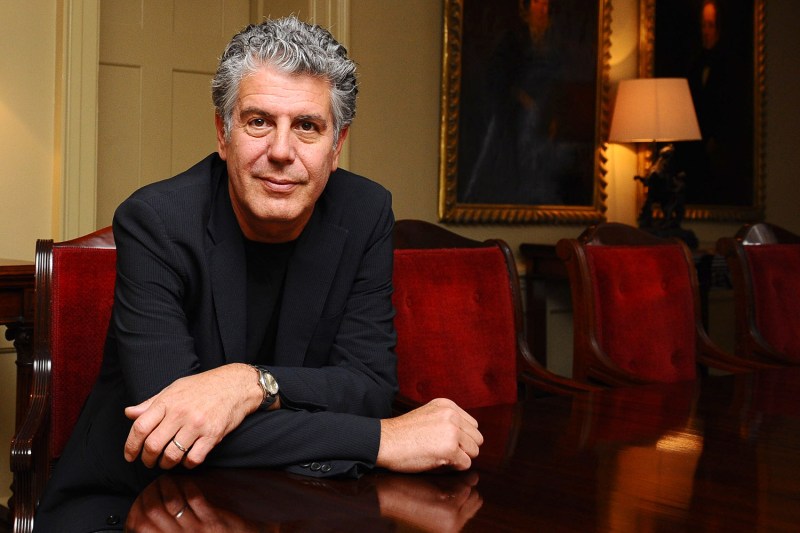
Because of this, Bourdain’s words, transcribed, occur throughout in a bolded blue that jumps out from the surrounding black text. Without getting too messianic, it feels like those red-letter bibles that highlight the words of Jesus for at-a-glance reference. It’s both incredibly effective as a means of delineation and a recurring reminder of his loss.
Woolever herself spent the last year of COVID lockdown in her adopted New York City largely working on the book, taking only a few brief trips to visit her parents upstate before returning back to her desk. In that time she also completed another book, an oral history of Bourdain’s life, which is expected to release in the fall. Of her late boss, “It’s a very big shadow to labor under,” she says, acknowledging the fact that these recent works may be the highest profile projects she ever completes despite a robust publishing background in the New York Times, GQ, Vogue, and elsewhere. But her labors have also been useful in dealing with her own grief over the loss of Bourdain. Rather than an abrupt close of a chapter of her life, these books have been a long goodbye. “To be able to work with him, in a way, has made it an easier transition to what comes next in my life,” she says.
Bourdain’s life is not merely the subject of her own work but in some ways its headwaters. She’d been working for Bourdain for about five years before accompanying him on her first trip, and when her child was finally old enough to be left alone, Bourdain told his assistant to pick from a list of upcoming destinations. She’s join the team, without responsibility, to get her feet wet, and he encouraged her to pitch broadly to outside publications so that she might make a few bucks and further establish herself as a writer.
Woolever selected Vietnam, a country for which Bourdain had long had a love. It was her first time in Asia. On that trip, the team traveled to the central part of the country — a new region for Bourdain — and Woolever remembers his excitement about Hue. She would cling to his back as they zipped between traffic on a scooter between sets. “That was an unbelievable pinch-me moment,” she says. “It also made me comfortable getting on a taxi scooter and doing my own thing. That to me will always be a special memory.
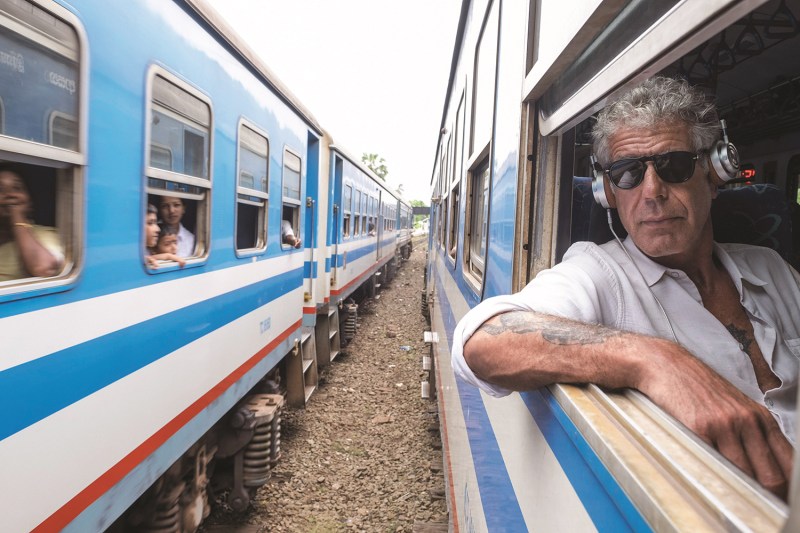
“Indelible,” she adds.
Besides a few blurry photos taken from scooter-back via iPhone (many of which include the back of Bourdain’s helmet), there isn’t much documented from that moment. Rather, it’s something Woolever cherishes, a memory that continues in strength despite Bourdain’s loss. His contribution to her writing, from one writer to another, also persists.
“This is what I’ve always wanted to do and, in the past few years of being able to concentrate on writing projects, has made me aware that this is the life that I want,” she says.
Retracing Bourdain’s steps meant a book that may be broad in scope but narrow in practicality. Divided alphabetically by country, there’s hardly equal representation, and the United States receives the lion’s share of space, with nearly a quarter of the book devoted to it. Conversely, the entire country of India, in Traveler, is seven pages long. Add to that the difficulty in confirmation of hole-in-the-wall places during a worldwide pandemic, the fact that some restaurants have since drifted far from what attracted Bourdain in the first place, and the frequency of invite-only home meals on the shows meant an imperfect product. “There were so many places in the world that he loved that weren’t in the book for those practical reasons,” she says. “But I wanted to deliver a book that gave people the Tony experience.”
The reality, as anyone who’s bought a Lonely Planet can attest, is that print books are an imperfect means of guiding travel. “Any time you’re printing a travel guide of any kind, at some point, it’s going to become obsolete,” Woolever admits. “But the spirit of the thing remains.”
That’s really what Traveler is about: Capturing the spirit of Bourdain at his peak. Remembered by many who never met him personally, following his footsteps, even across a page, is a remembrance of a brilliant and iconic writer.
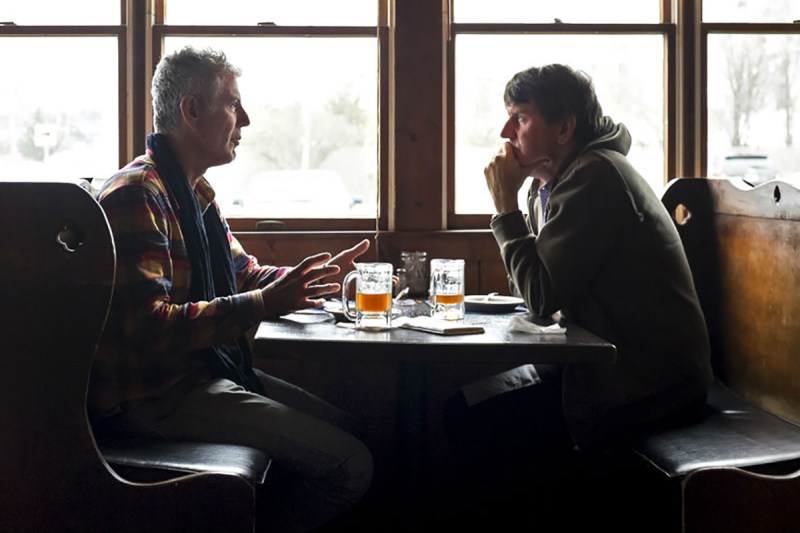
“He didn’t pull punches when he talked about the hours and the intensity and the environment of kitchen life, whereas some other did,” says Habiger, the engine of his car cut, speaking a few more minutes before his jiujitsu class.
Bourdain smashed into the national consciousness as a man telling it like it was in Kitchen Confidential: Adventures in the Culinary Underbelly
“What’s the phrase, ‘Writers never die?’” Habiger asks.
“His episodes were about so much more than food,” he says. “It’s an in-depth look at the world, and I’m thankful that we all still have those.”

